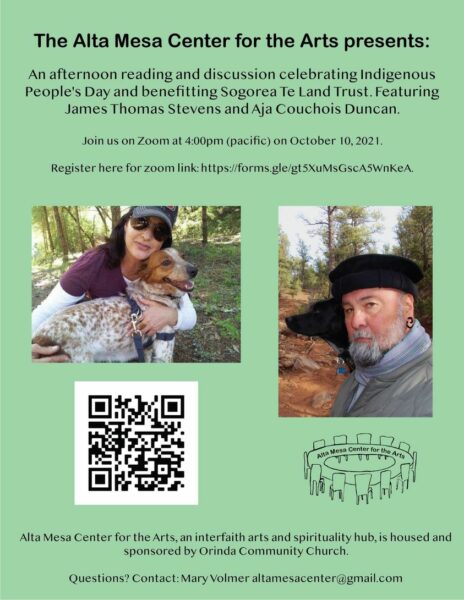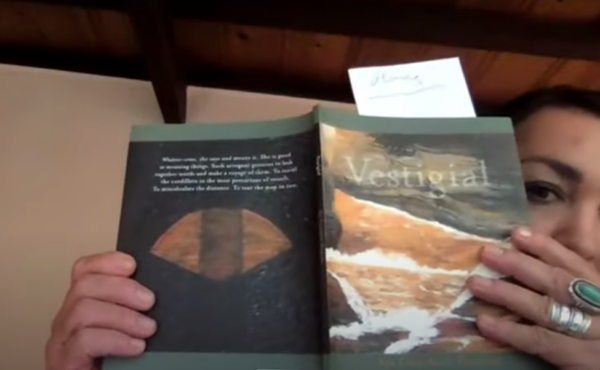Celebrating Aja Couchois Duncan’s Vestigial & Indigenous People’s Day | Alta Mesa Center for the Arts

Aja Couchois Duncan’s Vestigial, the follow-up to her 2016 Litmus book Restless Continent, was released on August 30th. To celebrate the launch of Vestigial—a poetic narrative “exploring evolution, biomedicine, gender, lust, climate change and loneliness”— Duncan joined poet James Thomas Stevens in a virtual reading and conversation hosted by the Alta Mesa Center for the Arts in California. The event was held on Indigenous People’s Day, and benefitted the indigenous women-led land trust Sogorea Te’, based in the San Francisco Bay Area.
Duncan began by speaking about her poetic process, quoting from the endnotes of her first book, in which she discusses the strange dilemma of using the very culture and language that has functioned, for centuries, as a colonizing tool, to enact the recovery of “lost, stolen and forgotten things.” She proceeded to read from the first section of Vestigial, titled “Accretion,” which lays the groundwork for a sweeping ecological origin story; an “indigenous narrative about aki, earth, and all of her inhabitants.”
Stevens read from his 15-part work titled “The Ritual of Condolence,” a meditation on death and communal healing, which yielded a rich and complex resonance with the concerns of Duncan’s writing.

During the Q&A moderated by Elizabeth Robinson, the two authors discussed their shared interest in using poetry to investigate scientific language and principles. Stevens remarked that “science is a colonizer’s tongue” while also acknowledging it as a fertile source of the concrete for the purpose of crafting poetic imagery; a practice which can, in turn, humanize and soften what has been an instrument of oppression. In response to this, Duncan spoke of poetry as a space that nurtures an authentic intimacy with people and things, and of the generative tension she finds between the immediacy of poetic thinking and the coldness of scientific doctrine. This led into a discussion of Duncan’s book title, Vestigial, a term she applies to “things that are no longer evolutionarily necessary but are physiologically present” and associates with science’s hubristic tendency to actively erase all of the meanings that it doesn’t have the tools to understand. On this form of scientific overreach Duncan remarked, “just because you don’t know what something is for, doesn’t mean it doesn’t have a reason for being.” Along these lines, a section of Vestigial titled “Divergence” articulates the impossibility of scientific certainty, the fallibility of its narrative formulae:
Evolution is a story whose time span is infinite. When aki rids itself of humans, forest will repossess the cities, binesiwag will reclaim the skies.
But their story is briefer, the telling is only as long as the length of their breath.
We invite you to view the full video recording of the event:
If you’d like to learn more about Duncan’s biography, read reviews of her work, or purchase a copy of Vestigial, please visit our bookstore.
